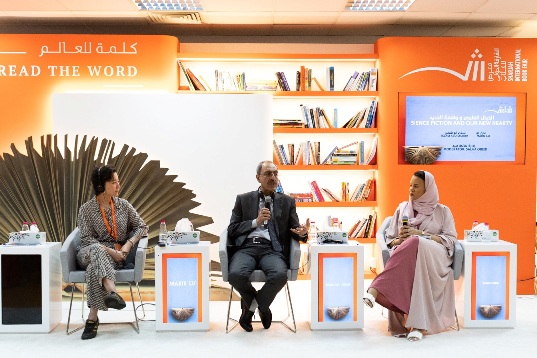Sharjah :
The blurring line between science fiction and our real world was a hot topic of
discussion on the opening day of the 3-day ThrillerFest at the ongoing 41st Sharjah
International Book Fair at Expo Centre Sharjah.
A panel of science fiction writers featuring American dystopian novelist Marie Lu, best
known for her Warcross and Young Elites series, and Syrian writer and novelist Islam
Abu Shakir, who lives in the UAE, said that the genre dealt with universal themes and
that stories considered science fiction in the past had become part of our reality today.
“We can use science fiction as a way of interpreting and reinterpreting what is
happening in our reality. I find it comforting even, as we can find solutions to what’s
happening in our world, allowing fictional characters to solve these huge problems we
face today,” said fantasy novelist Lu, who takes inspiration from real-life video games.
Shakir agreed that science fiction has an increasing relevance in today’s rapidly
transforming world. “In the past, the kind of instant communication technologies that we
enjoy today was indeed a part of science fiction. So was the idea of travelling between
planets, but today they are becoming a reality.
The future is open to all potential and possibilities and this is a chance for science fiction
writers to write about tomorrow, building upon the facts we have today to build their own
visions of the future,” he said.
“It’s sobering to think that a lot of elements of science fiction in the past are now part of
our reality,” agreed Lu, who illustrated an example of the overlap between science
fiction and reality that occurred during the time she wrote her Warcross series.
The Young Adults writer described how while writing about Augmented Reality lenses
that could connect to the mind and project human thoughts, the news came out that
business magnate Elon Musk was working on his Neuralink brain-machine interface.
“They say fantasies are stories that cannot happen, but science fiction is stories that just
haven’t happened yet,” Lu said.
Shakir agreed that as a writer of work often classified as not “realistic” enough, he finds
that the gap between the fantastic and the real is closing quickly and it is not possible to
clearly demarcate between the two in our current, fast-paced modern world.
The writers agreed that science fiction writers possibly need to make more of an effort
to tackle real-world issues. “Often, when writers go into their stories, they are not
actively trying to problem-solve, they are also afraid to talk about it. There is a middle
ground.
Science fiction can be a tool through which we can find solutions to real-life problems.
We can also do it in a way that empowers people to think they can make a difference,”
concluded Lu.
